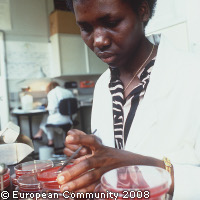EU contributes EUR 40 million to fight against infectious diseases
The European Commission has promised EUR 40 million in funding to the European and Developing Countries Clinical Trials Partnership (EDCTP). The amount signifies half of the EUR 80 million that the EDCTP has approved for research into the prevention of poverty-related diseases in Africa. This latest funding announcement from the EDCTP represents the highest amount of funding approved to date by the body. The EU's contribution will be matched by the EU Member States and third parties involved in the initiative. The money will go towards research into tuberculosis vaccines, malaria treatments, malaria vaccines and studies on malaria in pregnancy. Further funding for HIV vaccines, treatments and microbicides and TB treatment is expected to be made available later this year. The trials initiated by the EDCTP involving TB and malaria will also be combined with capacity building and networking activities. These will ensure the long term sustainability of clinical trials in the region. A number of projects will focus on creating and developing capacity for ethics reviews of clinical trials and on enhancing the regulatory framework needed for approval of medicines in Africa. This enables African countries to conduct high-quality and ethically sound clinical trials, and to assess the safety and efficacy of all medicines that enter the African market. 'This decision from the EDCTP General Assembly shows the commitment of the participating countries and the European Commission in the fight against the three main poverty-related diseases in and for Africa,' commented European Science and Research Commissioner Janez Potocnik. 'We're confident that our cooperation with African researchers will make a difference'. 'This is a very significant milestone for collaboration between north and south in the fight against the three main diseases of poverty, namely HIV/AIDS, tuberculosis and malaria,' added Professor Charles Mgone, EDCTP's Executive Director. 'It is also very gratifying to note that among the 26 projects approved for funding, 22 have African scientists based in Africa as their principal investigators. This underscores EDCTP's objective of fostering a genuine partnership and enhancing clinical research capacity in Africa.' The EDCTP is a partnership of 14 European Member States plus Norway, Switzerland and sub-Saharan countries. Its aim is to reduce the global burden of HIV/AIDS, TB and malaria by pooling resources for conducting clinical trials in sub-Saharan Africa. This will be achieved through combining research to speed up the development of new or improved drugs, vaccines, diagnostics and microbicides against HIV/AIDS, malaria and tuberculosis, through trials in sub-Saharan Africa. Diseases such as malaria, tuberculosis, HIV and AIDS are major threats to developing countries, and especially to the countries of Africa. 2002 figures show that seven out of ten children diagnosed as living with HIV and AIDS were living in Sub-Saharan Africa. In 1999 an estimated 860,000 African children lost their teachers to AIDS. While malaria and tuberculosis have been eradicated to a large degree in Europe, they still cause strife in Africa. Malaria is responsible for up to a quarter of child deaths in the developing world, while tuberculosis kills about two million people a year.



